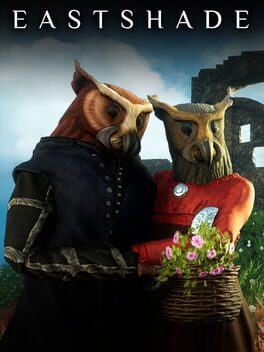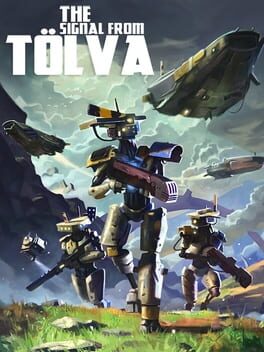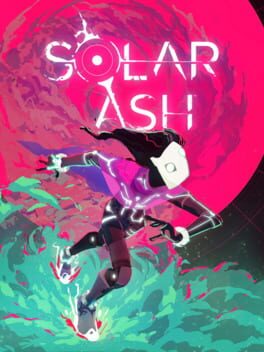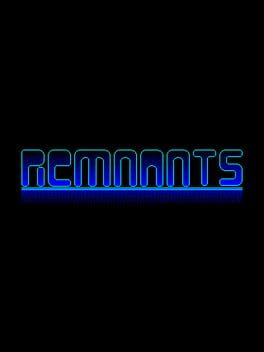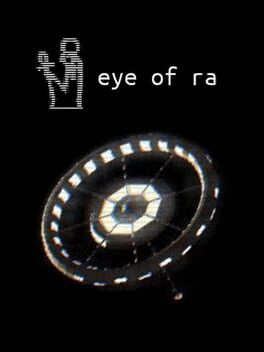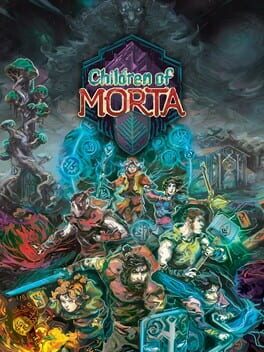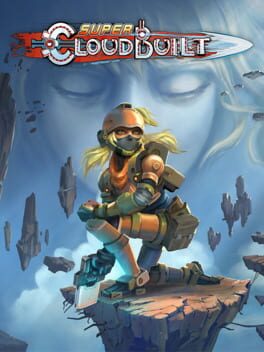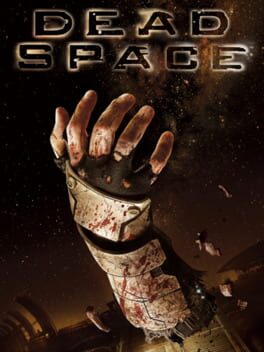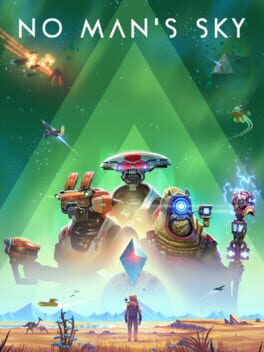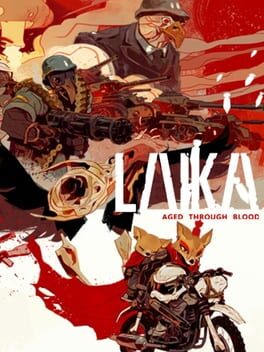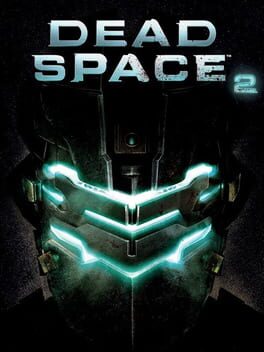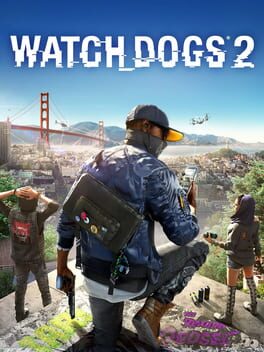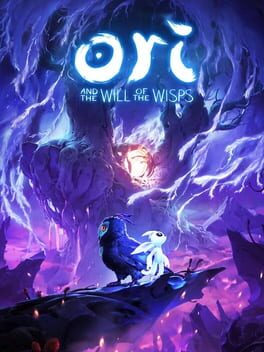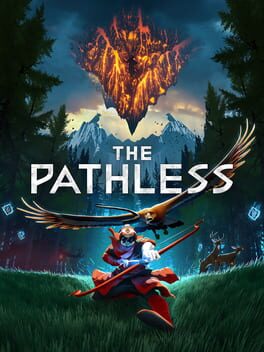Hyetal
BACKER
2019
Reminds me a little of Betrayer from 2014. Striking aesthetic and competently designed, if just a little repetitive.
More than anything it instills a sense of place. The planet has a distinct, palpable history; it's seen life and death in equal measure. Environmental storytelling isn't novel, but I'm guessing it'll always hit the spot for me. Games are at their best when they allow the space to speak for itself.
All Tölva needs is a good listener.
More than anything it instills a sense of place. The planet has a distinct, palpable history; it's seen life and death in equal measure. Environmental storytelling isn't novel, but I'm guessing it'll always hit the spot for me. Games are at their best when they allow the space to speak for itself.
All Tölva needs is a good listener.
2021
(warning: kinda revealing on protagonist's role in the story, more implication than explicit, but)
An audio-visual masterpiece. The environments are gorgeous, so layered in scope. It's a pleasure to blast through the world, and even if the combat is a touch rote by the end, you can feel the effort and see the competent hands at work in every frame.
... I don't like the writing very much. I find myself longing for how muted Hyper Light Drifter was. I don't mind all of it. I mostly liked—if not loved—the performances, the secondary characters, the interstitials.
But the scattered storytelling afforded by audio logs you can technically collect in any order is genuinely a baffling choice. It necessitates an oblivious protagonist, at least as it's been executed here, and I had so much trouble connecting with Rei because of it. Her musings and observations are almost entirely divorced from the context of all the other things she's witnessed.
It's real armchair designer shit, but what this means to me is that she's not allowed to doubt her purpose. She's not allowed to sincerely interrogate what she's learning. She's accumulating discrete pieces of information, seemingly helpless to construct the bigger picture. Given the fraught nature of her mission, experiencing serious doubt about what's happening here is not only a sensible reaction, it's a prerequisite for a person to be believable.
I don't think it's a compelling way to frame your main character. I kept wanting Rei to follow a thought. You know? Like how you have a thought, and it establishes a chain of successive thoughts that leads you to something resembling a conclusion? You know, right? It's that thing people do. Even if it's a hassle sometimes, we more or less can't help it. She doesn't do that. Just flailing at an attempt would be enough.
She feels like a victim of the structure, a storyteller's pawn, not a person who makes choices.
And... even if there's an overriding reason for why she hardly ever reaches any conclusions, and she's simply deluding herself, I never got the sense that she's struggling with that delusion. I'd get it. I can understand what's going on, she can ignore the obvious, embroiled in that struggle. But that requires her to struggle.
Despite how overwhelmingly critical that all was, I did enjoy the game. It's worth playing just to see the space they've crafted. It's fantastic.
An audio-visual masterpiece. The environments are gorgeous, so layered in scope. It's a pleasure to blast through the world, and even if the combat is a touch rote by the end, you can feel the effort and see the competent hands at work in every frame.
... I don't like the writing very much. I find myself longing for how muted Hyper Light Drifter was. I don't mind all of it. I mostly liked—if not loved—the performances, the secondary characters, the interstitials.
But the scattered storytelling afforded by audio logs you can technically collect in any order is genuinely a baffling choice. It necessitates an oblivious protagonist, at least as it's been executed here, and I had so much trouble connecting with Rei because of it. Her musings and observations are almost entirely divorced from the context of all the other things she's witnessed.
It's real armchair designer shit, but what this means to me is that she's not allowed to doubt her purpose. She's not allowed to sincerely interrogate what she's learning. She's accumulating discrete pieces of information, seemingly helpless to construct the bigger picture. Given the fraught nature of her mission, experiencing serious doubt about what's happening here is not only a sensible reaction, it's a prerequisite for a person to be believable.
I don't think it's a compelling way to frame your main character. I kept wanting Rei to follow a thought. You know? Like how you have a thought, and it establishes a chain of successive thoughts that leads you to something resembling a conclusion? You know, right? It's that thing people do. Even if it's a hassle sometimes, we more or less can't help it. She doesn't do that. Just flailing at an attempt would be enough.
She feels like a victim of the structure, a storyteller's pawn, not a person who makes choices.
And... even if there's an overriding reason for why she hardly ever reaches any conclusions, and she's simply deluding herself, I never got the sense that she's struggling with that delusion. I'd get it. I can understand what's going on, she can ignore the obvious, embroiled in that struggle. But that requires her to struggle.
Despite how overwhelmingly critical that all was, I did enjoy the game. It's worth playing just to see the space they've crafted. It's fantastic.
2019
2020
2018
The cumbersome interface and the vaguely scattershot approach to storytelling are clearly deliberate, but I would've liked some of the ancillary worldbuilding to be slightly more structured. Or directed, maybe. You risk a thematic sucker punch with this style. Though that can be effective, too.
It takes a big swing. Hard not to respect that.
It takes a big swing. Hard not to respect that.
2019
Really solid arpg. Some of the characters felt superfluous, or maybe underdeveloped... eh, most* of them were fun.
The final boss fell a little flat. One of the phases was interesting conceptually - just kinda tame as is. The storytelling otherwise was agonizingly ineffective; tedious, overwritten, predictable. Not for lack of trying! The craft is ambitious, just uninspired.
The droning narration did nothing for me. Bastion's implementation felt more organic, lively. It's a tired reference, I know. I don't think this VA did a particularly egregious job, but Logan Cunningham presents an unfavorable comparison.
Still a good time.
*I would play a full entire game starring Lucy. Her feral yelps of joy, throwing chaotic fireballs at an outrageous clip, man, that shit is life-giving. There's also a decent amount of room in her abilities for a way more developed, nuanced character.
The final boss fell a little flat. One of the phases was interesting conceptually - just kinda tame as is. The storytelling otherwise was agonizingly ineffective; tedious, overwritten, predictable. Not for lack of trying! The craft is ambitious, just uninspired.
The droning narration did nothing for me. Bastion's implementation felt more organic, lively. It's a tired reference, I know. I don't think this VA did a particularly egregious job, but Logan Cunningham presents an unfavorable comparison.
Still a good time.
*I would play a full entire game starring Lucy. Her feral yelps of joy, throwing chaotic fireballs at an outrageous clip, man, that shit is life-giving. There's also a decent amount of room in her abilities for a way more developed, nuanced character.
2017
Tough to recommend, but you'll know if this is your kinda shit by watching some gameplay. Super Cloudbuilt hands you a toolset that empowers and humbles you with alternating current, which probably has niche appeal.
I haven't played a game that enables this much speed and control since Thumper, and that's no mean feat. It's worth a look if you're a fan of responsive movement with immense mechanical depth.
I haven't played a game that enables this much speed and control since Thumper, and that's no mean feat. It's worth a look if you're a fan of responsive movement with immense mechanical depth.
2008
Ineffective horror situated against a final act that steadily unravels into an unsatisfying and deeply unimpressive ending. Climactic it ain't.
But the combat holds up really well! Tearing pieces off a smorgasbord of zombies is just as fun as it was 12 years ago. The weapons are so good that I wish they'd more actively push the player to experiment. Why would anyone use a "Force Gun" in a game all about dismemberment? (dope gun, you should use it)
It's a solid world with slightly too-familiar roots, though original storytelling is probably not why you're playing Dead Space. The game itself is a few hours too long, but the traversal—even retreading old ground—feels surprisingly organic. Despite an over-reliance on the tram system (which I assume is a technical limitation), they manage a really strong pace on the back of level design alone.
Even as the story comes to a screeching halt and slowly suffocates in the vacuum of space.
But the combat holds up really well! Tearing pieces off a smorgasbord of zombies is just as fun as it was 12 years ago. The weapons are so good that I wish they'd more actively push the player to experiment. Why would anyone use a "Force Gun" in a game all about dismemberment? (dope gun, you should use it)
It's a solid world with slightly too-familiar roots, though original storytelling is probably not why you're playing Dead Space. The game itself is a few hours too long, but the traversal—even retreading old ground—feels surprisingly organic. Despite an over-reliance on the tram system (which I assume is a technical limitation), they manage a really strong pace on the back of level design alone.
Even as the story comes to a screeching halt and slowly suffocates in the vacuum of space.
2016
I don't think I like a single one of the systems they've added to this game post-launch. It's a shallow mess of unending tasks and upkeep. The relatively infinite cosmos at your fingertips, the wonder of space on tap, and they've furnished it with what feels like an insatiable fear that you might for one second be unoccupied. Unbothered.
If they let you hit a button to disable the mission log, and jettison most of the Fun to opt-in, that might be nice. Could be something. It's just incessant, the noise, the overtures beseeching you onto a plethora of colorful, ornate treadmills that all end up the exact same place.
Nowhere. They're treadmills.
If they let you hit a button to disable the mission log, and jettison most of the Fun to opt-in, that might be nice. Could be something. It's just incessant, the noise, the overtures beseeching you onto a plethora of colorful, ornate treadmills that all end up the exact same place.
Nowhere. They're treadmills.
2011
If you skip past the main menu of either of the first two Dead Space games, and you spend not too much time scrutinizing shit like tutorialization and texture quality, you probably won't stop to consider their age. The diegetic interface escapes most of the telltale signs of contemporary sensibilities, at least on the surface, and the sound and art design are strong enough to carry dated fidelity. It's not immediately clear to me that Dead Space 1 is twelve years old, which is really impressive.¹
Dead Space 2 opens in much the same way as its older sibling, carrying the interface forward, but there's no mistaking this period of games. Isaac has a voice, and he's not afraid to use it. He's here to exclaim like a big boy ("Fuck," Isaac exclaims)—he'll even employ bigger sentences as smaller parts of Cutscenes™! Isaac is a character that speaks and has something resembling a personality. That's observable fact.
Okay, the cinematic touchstones are generally fine.² Isaac being tossed around by a rampaging necromorph (read: angry space zombie) who intends him terrible, gore-fueled harm— it's exciting, right? Sure. I'm just not convinced the burgeoning Uncharted era did much good for developers who seemed pressured to prioritize 'loud' for their next project. Probably can't blame just Nathan Drake³ for that one. But what the fuck do I know, maybe this is exactly what Visceral wanted to make.
Everything is polished to a crisp sheen. Movement, gunplay, the kinesis ability, they're refined and equipped for a faster pace; the relatively linear action of a cinematic shooter. As someone who thought the shooting in Dead Space 1 was great, this is mostly improved. But it is missing something. Grit, maybe. An amiable friction that would never survive so much dedicated polish. On balance, I think both hit similar highs. On the other hand, there's no low in this quite as bad as how the first game ends, which is nice.
I've seen folks argue that Dead Space 2 moves away from horror in ways reminiscent of T1->T2, or Alien to Aliens, and while I believe that's ostensibly true, the horror in this series was always bodily, and just about every misguided step into psychological tension is clumsy at its very best. In that sense, the notion that the sequel shifts focus is largely successful, because you have less time spent showcasing trope-ridden writing somehow meant to elicit terror. Marginally. There's still a lot.
I like Dead Space 2, though. Even nine years later, games that involve guns in some form don't often attempt this level of granular interplay. It's underpinned by a morbid—and silly—premise ("[...] the limbs!!!" they scream, hoping the player will finally understand), but that's all in service of a genuinely fun game.
Except the part where it occasionally confuses pitch black darkness for 'scary'. I wish it wouldn't do that. I'm not scared, I just can't see.
Both Dead Space 1 and 2 are worth revisiting in 2020. It's a good time. Got me wondering about 3, but that shit was tired even with a two-year interval back in 2013, so I don't have much hope.
——
¹ Too Human also released in 2008. Peruse screenshots at your leisure.
² Quick-time events are not fine.
³ It's capitalism. And Nathan Drake.
——
Dead Space 2 opens in much the same way as its older sibling, carrying the interface forward, but there's no mistaking this period of games. Isaac has a voice, and he's not afraid to use it. He's here to exclaim like a big boy ("Fuck," Isaac exclaims)—he'll even employ bigger sentences as smaller parts of Cutscenes™! Isaac is a character that speaks and has something resembling a personality. That's observable fact.
Okay, the cinematic touchstones are generally fine.² Isaac being tossed around by a rampaging necromorph (read: angry space zombie) who intends him terrible, gore-fueled harm— it's exciting, right? Sure. I'm just not convinced the burgeoning Uncharted era did much good for developers who seemed pressured to prioritize 'loud' for their next project. Probably can't blame just Nathan Drake³ for that one. But what the fuck do I know, maybe this is exactly what Visceral wanted to make.
Everything is polished to a crisp sheen. Movement, gunplay, the kinesis ability, they're refined and equipped for a faster pace; the relatively linear action of a cinematic shooter. As someone who thought the shooting in Dead Space 1 was great, this is mostly improved. But it is missing something. Grit, maybe. An amiable friction that would never survive so much dedicated polish. On balance, I think both hit similar highs. On the other hand, there's no low in this quite as bad as how the first game ends, which is nice.
I've seen folks argue that Dead Space 2 moves away from horror in ways reminiscent of T1->T2, or Alien to Aliens, and while I believe that's ostensibly true, the horror in this series was always bodily, and just about every misguided step into psychological tension is clumsy at its very best. In that sense, the notion that the sequel shifts focus is largely successful, because you have less time spent showcasing trope-ridden writing somehow meant to elicit terror. Marginally. There's still a lot.
I like Dead Space 2, though. Even nine years later, games that involve guns in some form don't often attempt this level of granular interplay. It's underpinned by a morbid—and silly—premise ("[...] the limbs!!!" they scream, hoping the player will finally understand), but that's all in service of a genuinely fun game.
Except the part where it occasionally confuses pitch black darkness for 'scary'. I wish it wouldn't do that. I'm not scared, I just can't see.
Both Dead Space 1 and 2 are worth revisiting in 2020. It's a good time. Got me wondering about 3, but that shit was tired even with a two-year interval back in 2013, so I don't have much hope.
——
¹ Too Human also released in 2008. Peruse screenshots at your leisure.
² Quick-time events are not fine.
³ It's capitalism. And Nathan Drake.
——
2016
Burns so much goodwill in the back half. What was otherwise an awesome game is tarnished by a gross attempt to shortcut an "emotional" arc.
It sucks, because they set up a great world with endearing characters. And I could even accept the totally dissonant availability of lethal force - it's still a AAA video game after all.
They just dropped the ball.
(Still better than WD1, though. Fuck Aiden Pearce and his iconic hat.)
It sucks, because they set up a great world with endearing characters. And I could even accept the totally dissonant availability of lethal force - it's still a AAA video game after all.
They just dropped the ball.
(Still better than WD1, though. Fuck Aiden Pearce and his iconic hat.)
As much as I enjoy the... environmental puzzle-movement (is this anything?)... and the fantastic music, they can't salvage a story that I believe fundamentally misunderstands its own antagonist. And recycling the central pathos of the first game was a bizarre choice. Didn't work for me, I guess.
I'd have to replay both and spend more time thinking about this to construct anything resembling analysis, but all I can muster is a leaden sigh. Despite so much to do, such an abundance of content, the game ultimately feels kinda empty.
I'd have to replay both and spend more time thinking about this to construct anything resembling analysis, but all I can muster is a leaden sigh. Despite so much to do, such an abundance of content, the game ultimately feels kinda empty.
2020
Every explicit bit of storytelling in this game is like that Garth Marenghi clip about subtext exploded into an 8-hour action adventure. I swear every new game I play only serves to remind me that writing is fucking hard, and I wish developers would be less afraid of leaving things unsaid. Likely wouldn't have done much to improve what is ultimately a tedious plot structure, but hey. Baby steps.
The traversal is really fun.
The traversal is really fun.
